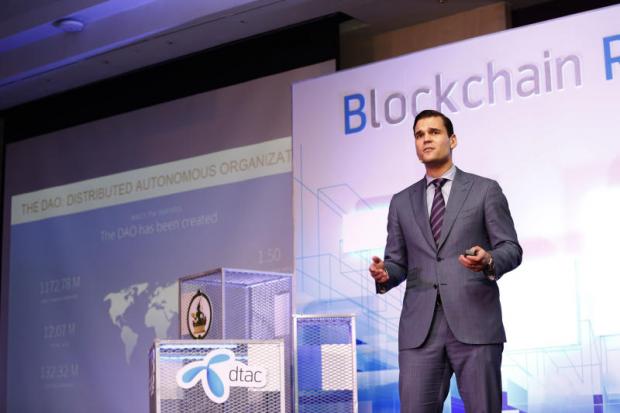
Thailand should prepare for the disruptive technology known as blockchain to gain the early-adopter advantage and improve quality of life, says a global blockchain expert.
"Bangkok can channel disruptive technology in a manner similar to Singapore, Hong Kong, Berlin and London in order to survive in the second era of the internet," said Alex Tapscott, chief executive of Northwest Passage Ventures, a blockchain business consulting firm.
The development of internet users in Thailand has been proceeding at a fast pace, with 60% internet penetration among the population and 40% having access through smartphones.
Blockchain is regarded as the second generation of the internet, said Mr Tapscott, adding that the technology's capabilities for gathering, containing and analysing data could bring financial technology to another level of development, enhancing stock markets, bonds and intellectual property.
Blockchain is a trust network platform which is a distributed ledger comprised of unchangeable, digitally recorded data in packages called blocks. These digitally recorded "blocks" of data are stored in a linear chain. Each block in the chain contains data that is cryptographically hashed.
The blocks of hashed data draw upon the previous block in the chain, ensuring all data in the overall blockchain has not been tampered with and remains unchanged. That makes it vital for storing valued digital assets.
"There are things you can do with blockchain technology that were not possible during the first decade of the internet, when we could only use it to contain information, search for information and share information," Mr Tapscott told the "Blockchain Revolution" seminar hosted by Total Access Communication Plc (DTAC).
"This is technology that will have the greatest impact on the world, both economically and socially. We will also see changes across industries, not just in the financial sector, but also in governments, manufacturing supply-chains and power generation."
He said the new technology eases peer-to-peer transactions without any intermediary such as a bank or governing body.
Keeping the user's information anonymous, the blockchain validates and keeps a permanent public record of all transactions, therefore enabling decentralised autonomous organisations, decentralised government services and transactions among internet-connected things.
Blockchain enables citizen to own and monetise their data and protect their privacy, while allowing them to manage and control their virtual identities. The technology could further force governments to be more transparent and engaged with citizens.
DTAC chief executive Lars Norling said blockchain has great potential to transform business in Thailand and contribute to country' growth through disruptive technology, aligning with Thailand 4.0 development model.
